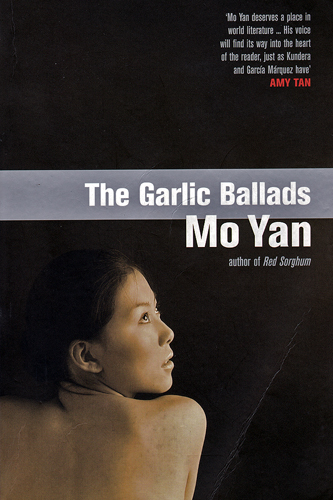The Garlic Ballads /天堂蒜薹之歌 by Mo Yan莫言 (A Book Review)
Mo Yan/莫言
1988
A close Call
Shit!’, I thought and my heart sank as the Chinese border police picked up the book and looked at it. Having just rigorously gone through all the photos on my digital camera, he was now holding a book that was still banned in China, as far as I knew. In normal times I wouldn’t have cared too much; the book would have been confiscated, the officers would have smiled apologetically, and we would have been allowed to continue… But these were not normal times: it was July 2008 and the Beijing Olympics were still in full swing. Immigration Officers were under strict orders to give any stray foreigner entering China during that time a real grilling, looking out for undercover journalists, or just anybody who might disturb those perfectly orchestrated Games. We were neither, but we were the only foreigners on the boat from Thailand to Jinghong.
the only foreigners on the boat from Thailand to Jinghong
The young but diligent border guard stared at the book’s black cover: the picture of the garlic bulb seemed to be throbbing and Mo Yan’s name to be glowing. I waited. Was our trip to China about to end right here in the docks of Guanlei, without even setting foot on dry land?
a Hobbesian tale of rural China
The Garlic Ballads is a Hobbesian tale of rural China, where life does indeed seem short, violent and brutal. Set in the 1980s in Northern China, in the aftermath of Deng Xiaoping’s famous statement, ‘Getting Rich is glorious’, the Garlic Ballads highlights the breakdown in the relationship between the Chinese Communist Party (CCP) and the peasants. The latter, still clinging to the ideals of the revolution and age- old Chinese concepts of fair and honest leadership from officials, find themselves cheated, betrayed and even murdered by a new class of CCP leaders who scandalously grab every opportunity available to enrich themselves. Mo Yan spares no niceties in his vilification of this new China and its rulers.
cultivate garlic
In the story, the peasants of Paradise County are encouraged by local party bosses to plant and cultivate garlic, a crop the region is famous for. Great returns are promised. Instead, a glut of garlic collapses the market and ruins the peasants, who demand compensation from the authorities. The ensuing confrontation culminates in the sacking of the local party headquarters.
Mo Yan, moving between past and present, weaves his story around the reasons for – and consequences of the razing of the local CCP township offices. The fates of the principal characters, coming from three different families, are tragically entwined, and their lives overtaken by the snowballing events.
the brutalising effect of poverty
The reader is taken into a world of blighted lives, shaped by abject poverty. The language is coarse and rough, but at the same time real and very much alive. The characters’ outlook on life and their relationships are wholly conditioned by the desperate plight they find themselves in, struggling to survive in circumstances that always seem insurmountably adverse. While occasional displays of tenderness, loyalty and comradeship offer some light relief, it is the brutalising effect of poverty, and how it determines people’s lives and relationships, that forms a constant thread throughout the book.
a happy ending is conspicuous by its absence
As with many of China’s best modern writers, a happy ending is conspicuous by its absence.
Mo Yan, author of the acclaimed Red Sorgum, takes the reader into the unknown hinterland of China, far from tourist sites, bustling big cities or spruced- up model villages. After reading the Garlic Ballads, it is easy to understand why so many peasants abandoned the countryside, in search of a better life in the cities. What is more compelling for China’s future, is how these peasants will react to the current economic downturn and their forced return to those same villages they were trying to escape from. Getting rich may be glorious, but only for the lucky few who manage it.
‘Yingwen shu ma ?’ (Is it an English book?)
‘Yingwen shu ma ?’ (Is it an English book?), the official asked. When I replied affirmatively, he returned the book and picked up Margie’s diary instead. A few minutes later, we were in!


I really like your blog and i really appreciate the excellent quality content you are posting here for free for your online readers. thanks peace sandro